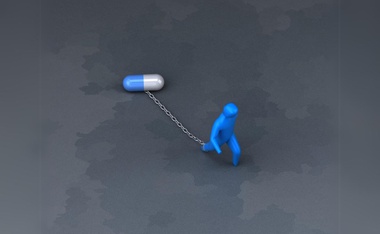The views expressed in our content reflect individual perspectives and do not represent the authoritative views of the Baha'i Faith.
Because I worked so long in addiction treatment settings, I got this question a lot: “My friend has a drug problem — what can I do?”
As you might imagine, I often suspected that the “friend” was really the person asking the question, but I always tried to answer in a straightforward, non-judgmental way. Over time, though, my answers changed pretty radically.
I tried to respond, too, in a loving way. The Baha’i teachings ask us to “…show forth the utmost loving-kindness to every living creature,” so in my earlier years, I favored the “tough love” approach.
RELATED: The Dire Baha’i Warning About Opioids
“Confront your friend!” I’d advise. “Do an intervention, and force him to go into treatment.” At that point, I had participated in several interventions where the addict’s entire family and community all got together to say they would withdraw their support and even all their contact with the person unless he seriously sought treatment.
I learned that interventions worked — sometimes. They also backfired sometimes when the addict wound up calling everyone’s bluff or just shrugged off any potential distancing or punishment and kept on using.
Later, after I’d become a little more experienced in the field and seen the tough love method fail once too often, I began adopting a kinder, gentler approach, one that I thought of as more consistent with a Baha’i-inspired approach.
Recognizing that addiction is a disease and not a failure of morality or will, I began counseling my questioners to try to gently persuade their friends to enter a rehabilitation treatment program or at least accompany them by going to a self-help meeting like Alcoholics Anonymous or Narcotics Anonymous. You’d be amazed — those AA and NA meetings take place in church basements, community halls, and meeting rooms everywhere, on every night of the week. They’re free, and they tend to be warm, welcoming, safe places for addicts and alcoholics to tell their stories and hear about the damage addictions do to others. “If you feel like getting high, go to a meeting,” I’d recommend.
I took lots of people to meetings.
But meetings, rehab, and treatment programs don’t always work for everyone, either. Although some people recover in those settings, the majority of people who go through the standard 28-day inpatient treatment tend to relapse. In fact, Maia Svalavitz’s book “Unbroken Brain: A Revolutionary New Way of Understanding Addiction” cites:
… one meta-analysis of dozens of studies over four decades, which found that empowering, empathetic treatments like cognitive behavioral therapy and motivational enhancement therapy, which nurture an internal willingness to change, work far better than the more traditional rehab approach of confronting denial and telling patients that they are powerless over their addiction.
But when the professional therapists in my organization, Homeless Health Care Los Angeles, began thinking about opening a large needle exchange program for IV drug users, I said, “This is going too far. Why would we ever actively enable IV drug abuse?”
Despite my strident objections, the board of directors of the organization decided to adopt a harm-reduction treatment model. Instead of turning actively using addicts away or giving help only to those who remain abstinent as so many traditional treatment programs do, the board and our physicians and treatment professionals reasoned that it was more important to keep them alive so they could consider and even attempt recovery from their addiction at some future point.
The professionals recognized that if those we treated used dirty needles, they had no long-term future — homeless drug addicts normally don’t have long life expectancies — so we would never have a chance to help them. Initially, I opposed this approach, but I was outvoted. So we opened the needle exchange program, and addicts came by the hundreds and even thousands, seeking clean needles every day.
Slowly, experiencing that process changed my opinion. When addicts came to the needle exchange program, I noticed they were furtive and shy at first, ashamed of their addictions and afraid of exposure. But gradually, as they got to know our very understanding and non-judgmental staff — many of whom had been addicts themselves, they became friends. We started to relate to each other as human beings, not as hypes, addicts, or druggies versus treatment professionals. A sense of trust developed. We saw the addicts for who they really were — people like us who had made a wrong turn in life and found themselves enslaved to a very addictive drug. After all, who hasn’t made mistakes in judgment? Who can cast the first stone?
When the addicts who came to the needle exchange developed that trust in us and learned we weren’t there to judge them, here’s what happened: almost every day, someone would say, “Hey, I’m sick and tired of being sick and tired, and I want to get clean. Can you help me?”
At that point, with our treatment center and its wide range of therapies ready, we had built up enough trust and credibility that an easy transition to recovery from addiction could take place — and did. That needle exchange program, still operating today, has now been responsible for the recovery of thousands of former addicts. Essentially, it keeps people alive until they’re ready to change.
RELATED: The Brain and Pain: Endorphins, Opioids, and Love
I learned (nowhere near as quickly as I should have) the wisdom of the Baha’i teaching that urges everyone to look upon others, no matter what their station in life, with extreme love and kindness:
So far as ye are able, ignite a candle of love in every meeting, and with tenderness rejoice and cheer ye every heart. Care for the stranger as for one of your own; show to alien souls the same loving kindness ye bestow upon your faithful friends. Should any come to blows with you, seek to be friends with him; should any stab you to the heart, be ye a healing salve unto his sores; should any taunt and mock at you, meet him with love. Should any heap his blame upon you, praise ye him; should he offer you a deadly poison, give him the choicest honey in exchange; and should he threaten your life, grant him a remedy that will heal him evermore. Should he be pain itself, be ye his medicine; should he be thorns, be ye his roses and sweet herbs. Perchance such ways and words from you will make this darksome world turn bright at last; will make this dusty earth turn heavenly, this devilish prison place become a royal palace of the Lord—so that war and strife will pass and be no more, and love and trust will pitch their tents on the summits of the world. Such is the essence of God’s admonitions …
So if your friend is an addict, or even if that “friend” is you, try this: “should he be pain itself, be ye his medicine.” Don’t get me wrong — addiction is a terrible disease, and addicts can take advantage of and even deeply hurt the people around them. Try not to let that happen, but just do your best to follow Abdu’l-Baha’s guidance, which advises us all to “meet him with love.”
















Comments
Sign in or create an account
Continue with Googleor